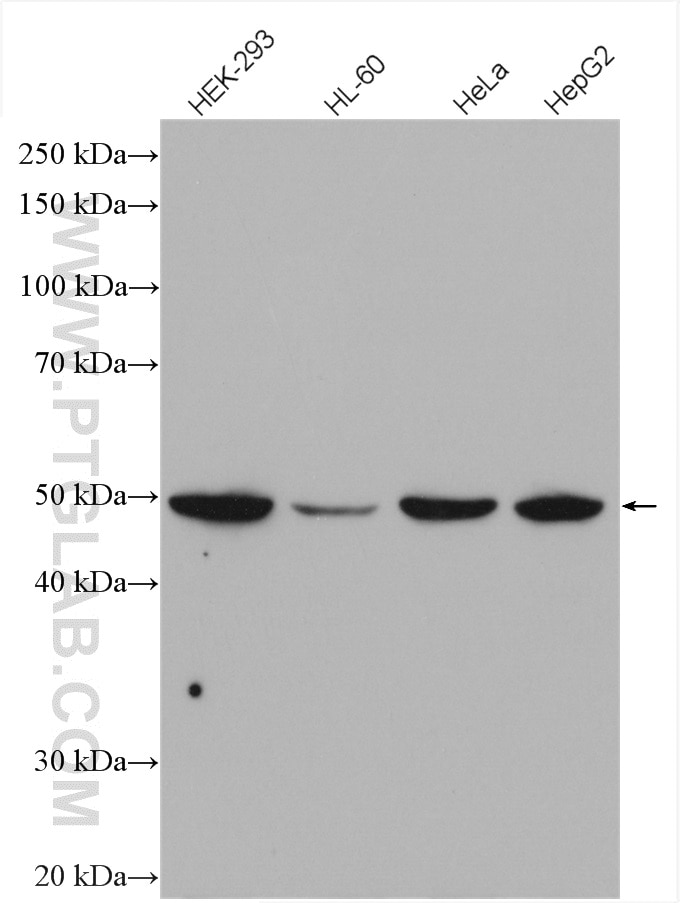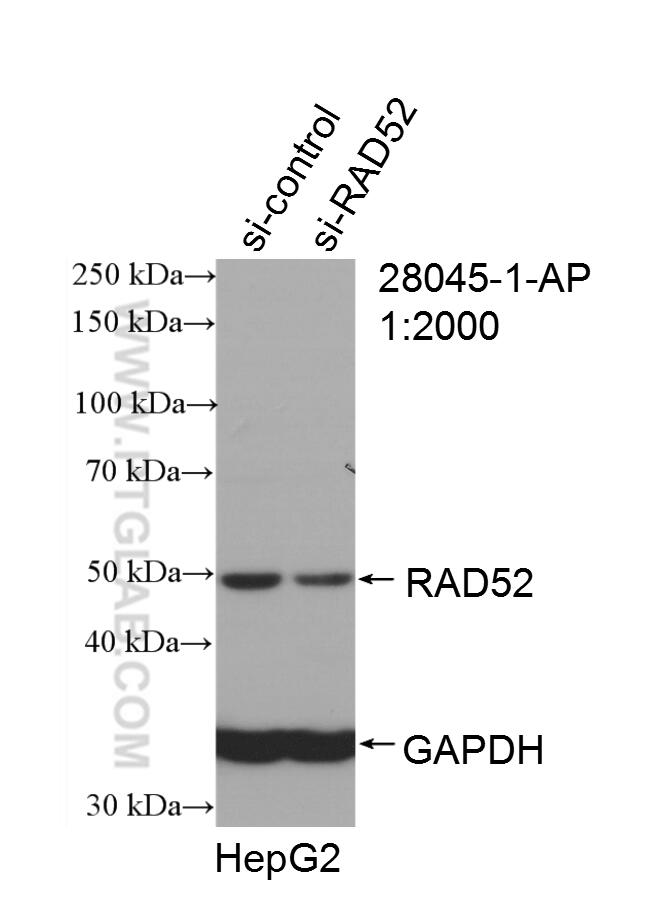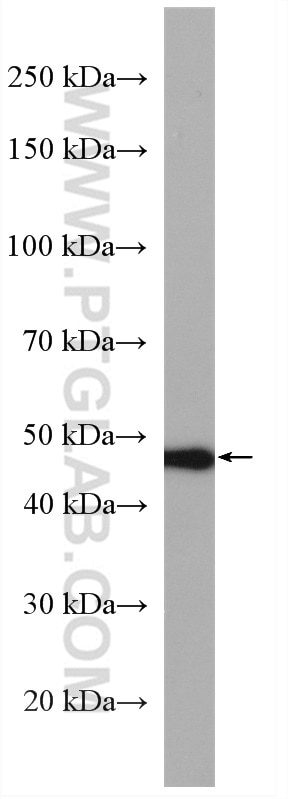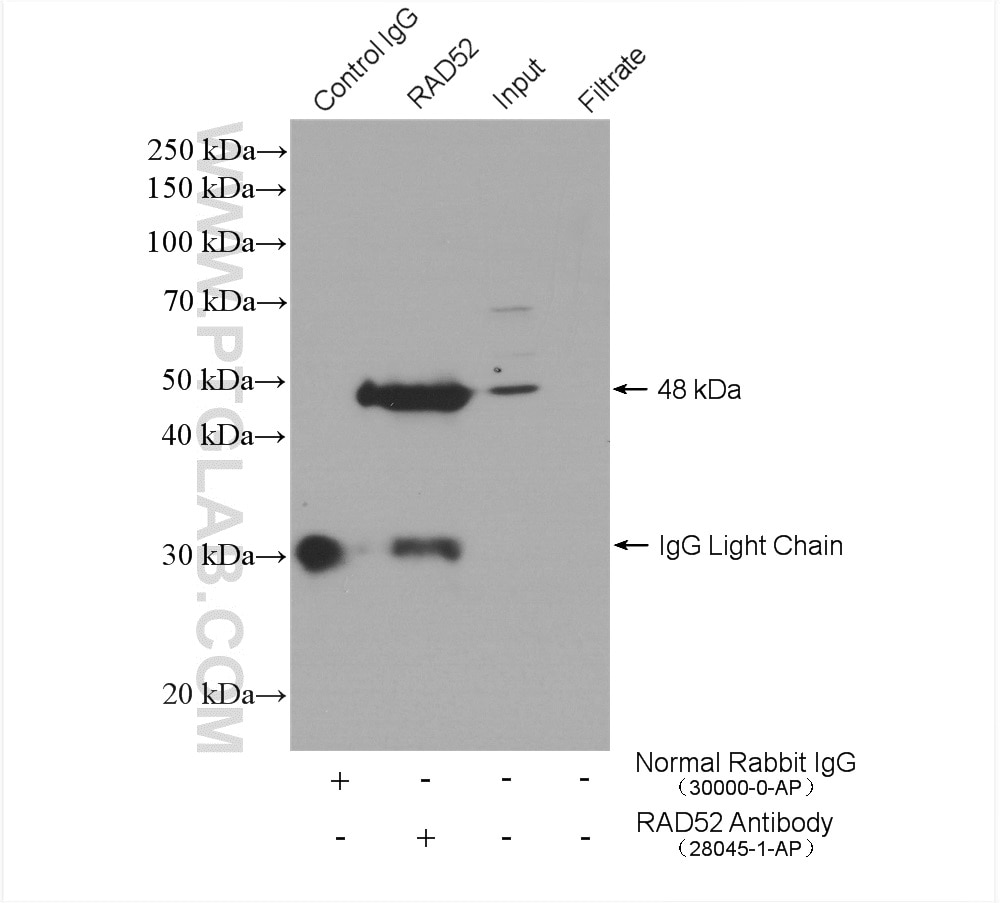- Featured Product
- KD/KO Validated
RAD52 Polyklonaler Antikörper
RAD52 Polyklonal Antikörper für IP, WB, ELISA
Wirt / Isotyp
Kaninchen / IgG
Getestete Reaktivität
human und mehr (1)
Anwendung
WB, IP, ELISA
Konjugation
Unkonjugiert
Kat-Nr. : 28045-1-AP
Synonyme
Galerie der Validierungsdaten
Geprüfte Anwendungen
| Erfolgreiche Detektion in WB | HEK-293-Zellen, HeLa-Zellen, HepG2-Zellen, HL-60-Zellen |
| Erfolgreiche IP | HEK-293-Zellen |
Empfohlene Verdünnung
| Anwendung | Verdünnung |
|---|---|
| Western Blot (WB) | WB : 1:1000-1:5000 |
| Immunpräzipitation (IP) | IP : 0.5-4.0 ug for 1.0-3.0 mg of total protein lysate |
| It is recommended that this reagent should be titrated in each testing system to obtain optimal results. | |
| Sample-dependent, check data in validation data gallery | |
Veröffentlichte Anwendungen
| KD/KO | See 2 publications below |
| WB | See 5 publications below |
Produktinformation
28045-1-AP bindet in WB, IP, ELISA RAD52 und zeigt Reaktivität mit human
| Getestete Reaktivität | human |
| In Publikationen genannte Reaktivität | human, Hausschwein |
| Wirt / Isotyp | Kaninchen / IgG |
| Klonalität | Polyklonal |
| Typ | Antikörper |
| Immunogen | RAD52 fusion protein Ag27619 |
| Vollständiger Name | RAD52 homolog (S. cerevisiae) |
| Berechnetes Molekulargewicht | 46 aa |
| Beobachtetes Molekulargewicht | 46-50 kDa |
| GenBank-Zugangsnummer | NM_001297419 |
| Gene symbol | RAD52 |
| Gene ID (NCBI) | 5893 |
| Konjugation | Unkonjugiert |
| Form | Liquid |
| Reinigungsmethode | Antigen-Affinitätsreinigung |
| Lagerungspuffer | PBS mit 0.02% Natriumazid und 50% Glycerin pH 7.3. |
| Lagerungsbedingungen | Bei -20°C lagern. Nach dem Versand ein Jahr lang stabil Aliquotieren ist bei -20oC Lagerung nicht notwendig. 20ul Größen enthalten 0,1% BSA. |
Protokolle
| Produktspezifische Protokolle | |
|---|---|
| WB protocol for RAD52 antibody 28045-1-AP | Protokoll herunterladen |
| IP protocol for RAD52 antibody 28045-1-AP | Protokoll herunterladen |
| Standard-Protokolle | |
|---|---|
| Klicken Sie hier, um unsere Standardprotokolle anzuzeigen |
Publikationen
| Species | Application | Title |
|---|---|---|
Sci Adv Deficiency in mammalian STN1 promotes colon cancer development via inhibiting DNA repair | ||
Int J Biochem Cell Biol Increasing CRISPR/Cas9-mediated homology-directed DNA repair by histone deacetylase inhibitors. | ||
Cell Death Dis SF3B4 promotes ovarian cancer progression by regulating alternative splicing of RAD52.
| ||
Nat Commun Pathway choice in the alternative telomere lengthening in neoplasia is dictated by replication fork processing mediated by EXD2's nuclease activity
|





